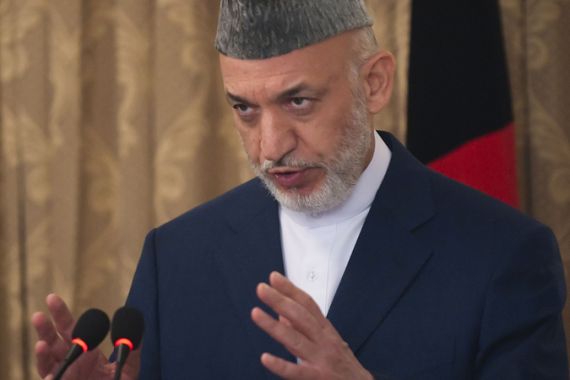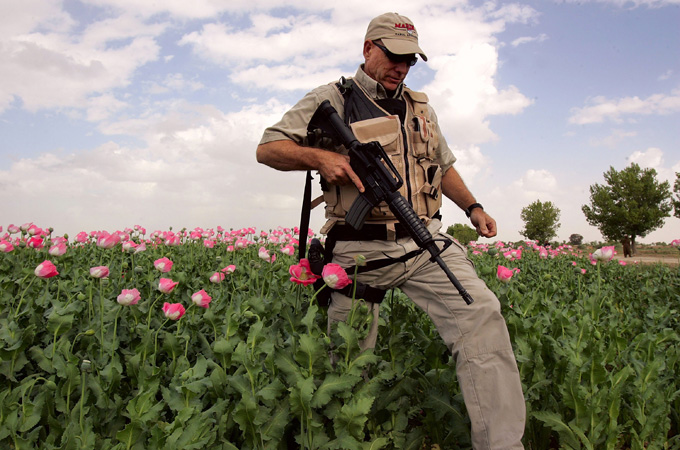Karzai slams private security firms
Afghan president accuses security companies of “blasts and terrorism” as he reiterates plan to ban them by year end.

 |
| The private security industry in Afghanistan generates billions of dollars in revenue every year [GALLO/GETTY] |
Hamid Karzai, the Afghan president, has accused private security firms of fuelling war in his country, while reiterating his commitment to ban them by the end of the year.
“These private security firms have caused insecurity and they’ve caused infringement of people’s rights,” he said on Monday, despite pressure from the US-led alliance on him to back down.
He added that the companies “cause the deaths of Afghan children, and they cause blasts and terrorism”.
“In fact we don’t yet know how many of these blasts are by Taliban and how many are carried out by them [security companies],” he said.
‘Compromise’
In August, the president ordered all security firms to disband by December, although he has since agreed that some of the firms could operate to provide security to reconstruction projects.
Karzai said disbanding security firms was in Afghanistan’s interest but admitted being under pressure from “the international community” to step back from dissolving all firms operating in the country.
Private security firms in Afghanistan are employed by US and Nato forces, the Pentagon, the United Nations, aid and non-governmental organisations, embassies and foreign media.
They employ about 26,000 registered personnel, though experts say the number could be as high as 40,000.
Most Afghan firms are operating as sub-contractors under mostly US companies.
Jermy Scahill, a journalist who has been writing about private security firms in Afghanistan and Iraq, said he did not think the plan will go ahead as the Nato forces in Afghanistan are heavily dependent on its armed contractors in the country.
“If they were to be expelled tomorrow, Nato operations would cease to exist,” he told Al Jazeera.
“US and Nato forces are not going to allow their contractors to be expelled. What I think will happen is that there will be some kind of compromise brokered … that they are going to come up with some formula where they classify the Nato contractors as diplomatic security, allowing them to stay in the country.”
Intense pressure
Private security firms have been unpopular in Afghanistan because of their involvement in sensational shootings and other incidents.
James Bays, AL Jazeera’s correspondent in the capital, Kabul, said Karzai has been under intense diplomatic pressure from the Nato alliance on the issue.
“Behind the scenes there’s been a great deal of effort to try and persuade the president to change his mind, to modify this decree,” he said.
While Karzai will allow private security to continue for diplomats and military bases, “he hasn’t changed the rules for aid agencies, for humanitarian workers, for construction workers – all who rely on private security to do their jobs every single day here in Afghanistan”.
Afghan authorities have already stopped issuing visas for private security employees, and some development projects have been halted.
“Private security companies have had a bad name, both here and in Iraq, but private security companies are how aid agencies get their work done,” our correspondent said.
“Western diplomats say that’s a very very worrying situation.”
Hillary Clinton, the US secretary of state, called Karzai on Saturday and recommended the US and Afghanistan develop a plan to replace private security guards gradually, rather than enforce a ban that could threaten millions of dollars in aid work.
A US senate inquiry into private security in Afghanistan concluded this month that funds had sometimes been funnelled to regional commanders who were linked to the Taliban, murder and kidnapping.